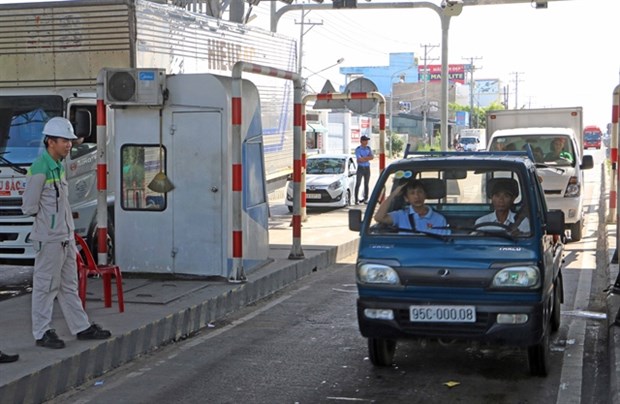 |
|
A pick-up passes through an electronic toll collection (ETC) plaza on Can Tho-Phung Hiep expressway
|
At present, a series of BOT (build-operation-transfer) projects is reporting considerably lower revenues compared to the original financial plans, as toll fee collection had plummeted due to the COVID-19 pandemic resulting in less traffic. The toll had not increased according to the schedule while investors still had to pay interest on bank loans, pushing them into financial hardship.
Therefore, the Ministry of Transport had sent the Government a proposal on supporting BOT infrastructure transport businesses to overcome the consequences of the COVID-19 pandemic.
According to the ministry’s report, since earlier this year, the COVID-19 pandemic has had negative impacts on all sectors of the country’s economy.
Among them, BOT enterprises had been directly affected due to a sharp decrease in vehicle transport leading to reductions of revenues, especially during the social distancing period.
Revenue of 58 out of 60 BOT projects were lower than the financial plans, especially 17 which had reached less than 50 percent of the plan.
In the circumstances, the BOT businesses had made a proposal to the transport ministry to seek solutions to support and remove the difficulties, such as rescheduling bank loan payments, not classified BOT businesses into the bad debt group, extending VAT and corporate income tax payment deadlines in 2019 and 2020, and reducing and exempting loan interest arising during the pandemic.
The businesses also suggested to allocate the State budget to offset the declining revenue when the BOT investors followed the Government and Prime Minister’s directions as well as ask the Government to buy part or all of the projects where the toll collection had not yet been carried out due to lack of security and order.
In terms of toll rates, the ministry proposed two options.
The first option is to increase the road toll rates under project contracts. The ministry would consider the appropriate time to carry out this measure, to minimise impacts on transport costs and instruct localities to arrange functional forces to ensure security and order at toll plazas.
The second option is to keep the current toll rates and increase the toll collection roadmap agreed in the contracts from 2022.
The Government will allocate about 5.080 trillion VND (217.8 million USD) as financial assistance to the projects which were not allowed to increase fees under the BOT contracts.
The Ministry of Planning and Investment would be assigned to calculate the budget.
The Ministry of Transport would negotiate with investors and banks about loan granting.
Analysing the pros and cons of the alternatives, the Ministry of Transport proposed the Prime Minister to consider and approve the first plan because it has more advantages and does not require sourcing from the State budget.
Additionally, the Ministry of Transport also suggested the Prime Minister to ask the State Bank of Vietnam and commercial banks to introduce supporting measures such as rescheduling loan payments and reducing bank loan interest arising during the pandemic.
The transport ministry asked the Prime Minister's permission to provide financial aid to the projects which suffered 50 percent revenue losses or more.
In some special cases, the Government should buy out the projects and allow businesses to extend VAT and corporate income tax payments of 2019 and 2020.
The transport ministry will continue cooperating with relevant ministries and local governments to review all BOT projects for setting up suitable measures which ensure publicity, transparency and harmony of interests of the State, people and investors as well as in accordance with the signed projects' contracts and granted investment registration certificates./.VNA
 The Ministry of Transport has recently proposed the Government to consider and approve the option of increasing BOT toll fees in order to remove difficulties for the investors who suffered revenue losses." itemprop="description" />
The Ministry of Transport has recently proposed the Government to consider and approve the option of increasing BOT toll fees in order to remove difficulties for the investors who suffered revenue losses." itemprop="description" />